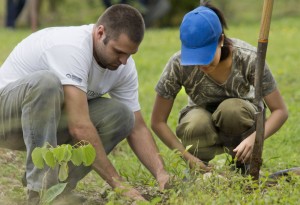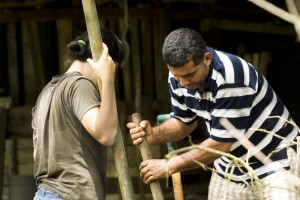Pickup soccer, empanadas, and community development: a conversation with four EARTH students
During their second year, students at EARTH University participate in the Community Development Program. As program participants, students spend their Wednesdays working to address problems, or assisting with projects, in nearby communities. In turn they gain real-world experience. Second-year students Grégory Laforest (’14, Haiti) and Juan Sebastián Camacho (’14, Ecuador) both worked on human development projects at Las Lomas earlier this year. Lina Gutiérrez (’14, Colombia) and Marlon Sánchez (’14, Honduras) are also second-year students. Lina is currently spending her Wednesdays at Las Lomas, and Marlon at a community called El Triunfo.
Below are excerpts from conversations with the students.
What were your projects at Las Lomas?
Grégory Laforest: I worked with children on a few different projects: a waste management project, a garden project, and I also taught English classes.
Juan Sebastián Camacho: We worked on three projects. The first project is called Proyecto Eco Agrotouristico La Cuna De Las Aves. It’s a tourism project that is lending a green feel to the community. The second project was a dairy cooperative, and the third project was the formation of a women’s group.
What are your current projects in the communities?
Lina Gutiérrez: We’re building greenhouses. A producer, Don Miguel, already had the bases of the columns for the greenhouses, and the roof was also in place when we arrived, so we’re making the garden beds. With Don Mario, we chose where to make the greenhouse. We picked the location with respect to the sunrise so the whole system will work well.
Marlon Sánchez: I work with banana producers. At the moment we’re helping maintain the plantation.
What did you think of the Community Development Program?
Grégory Laforest: The way I see it, you learn better when you’re in the field. I like being with people, because you don’t just learn academic facts, you also learn about human development. I enjoyed the experience because I’ve always liked education, but working with children, well at first I was a little nervous, but it was a great experience. I really enjoyed it! To the point that when the time came to leave, I had the feeling of, “Oh no! I don’t want to go!” The children, too: “You’re not coming back? No, don’t go!” You grow fond of them very quickly. And whenever there was a pickup soccer game they would always invite me to play with them!
Juan Sebastián Camacho: I loved it. Frankly, it was a very enriching experience, one that fills the soul. It was very special for me. Since I was working with organizations I wasn’t with one specific producer. I was working with five producers and visiting the others. So, during breaks, I’d be invited to different homes to eat an empanada, or for a coffee. You become a part of the community. It really is wonderful.
What is something you would like to learn from the Community Development Program?
Lina Marcela Gutiérrez: So far I’ve learned a lot, but something I’d like to learn is the agricultural techniques [the producers] use. Don Mario does a lot of sustainable work with fertilizers, compost, terraces, garden beds, and he has livestock, so I ask lots of questions, because I don’t know much about it. I ask about the grass and how [the livestock] is being fed. I’m asking questions about the things I want to learn.
What are you most excited or nervous about?
Marlon Sánchez: In reality, there is nothing to be nervous about. For me, it has been one of the best experiences I’ve had…it’s an opportunity to really see reality. Often times, the producer will say: “Look I have this plant, I would like you to diagnose it,” and so you have to see if you have the knowledge, or capacity, to diagnose it. If not, you have to have the strength to say, “I don’t know,” or “I’d like to analyze it with a professor.” We’re given that chance, so it’s a good experience.
What is one of your favorite memories?
Grégory Laforest: One day we were having class with the children and they asked if we could go outside. We went and sat beneath a tree and they began telling us what they were seeing in the community, in terms of the environment, because there was a hydroelectric project underway. The project was really affecting the community because they had to flood a part of the rainforest and cut everything down. The children had their own point of view about the environmental impact and the loss of biodiversity, and I remember the question they kept posing, “Why are they doing that? I don’t understand.” And so we talked. For me it was a beautiful moment, because some of us were sitting on the ground, and a few were up in the tree. [As adults] we don’t say everything. We hide a part, even though we say the truth, we still hide a part, but children don’t have that same reserve. Whatever they feel, they share.
Did you have a favorite project?
Juan Sebastián: Definitely. The tourism project was very applicable to us, our degree, and in line with the University’s vision. It’s spectacular and out of place that rural communities are beginning to work in ecotourism, and that they’re beginning to worry about the environment. It demonstrates that we are bringing about change. That change is what inspires our actions. So it’s definitely the most powerful project, the most fulfilling one.
What is one thought you took away from your time working with the community that you would like to share?
Grégory Laforest: A community’s development can’t exclude the education of children. If [adults] see their children involved in something, they are more likely to participate. Even though they themselves might not gather together, they come for the children, and there are messages there that they hear. If we want development to take place, the work the parents are doing now won’t count if there isn’t continuity, and continuity is through the children.
Juan Sebastián Camacho: I believe it’s very important, looking at the current political environment, that while leaders might come to power with socialist agendas, with the intention to help people, there is a problem: government handouts don’t lead to development. If a person doesn’t take control of his own personal development, if he depends on the government to give him money to eat, or depends on government handouts to live, then he will never rise out of poverty, he will always depend on the government. So I ask those reading this article to choose leaders carefully and to seek out development that will bring about more just countries.
The “Work Experience” course for second-year students gives them the confidence to work with communities in identifying needs and developing collaborative solutions to improve the quality of life. With your donation to EARTH’s community development program, together we can support them as they learn to put their leadership skills into truly meaningful practice.







FELICITACIONES es un gran reto todas estas actividades, ejemplos a seguir.. Comparto la interrogante de estos eco-niños ¿Por que se acaba conla biodiversidad? dicen que un niño es el mejor Maestro que hay… y hasta ellos no entienden ese ¿por que?…. El problema no es el Hombre… sino… la FALTA DE CONCIENCIA 🙁 … Aplaudo esta maravillosa labor que implementan los estudiantes de EARTH… Saludos desde Venezuela..